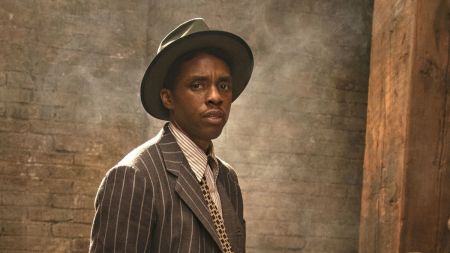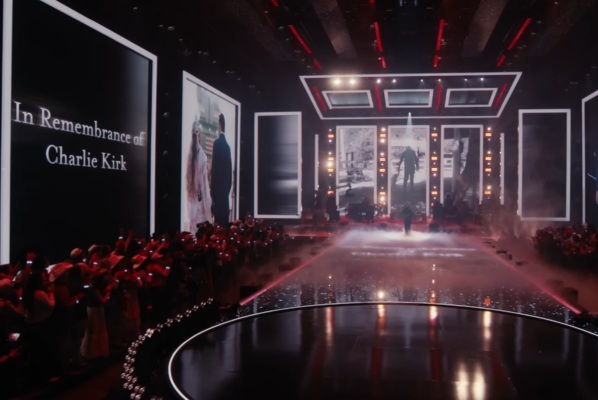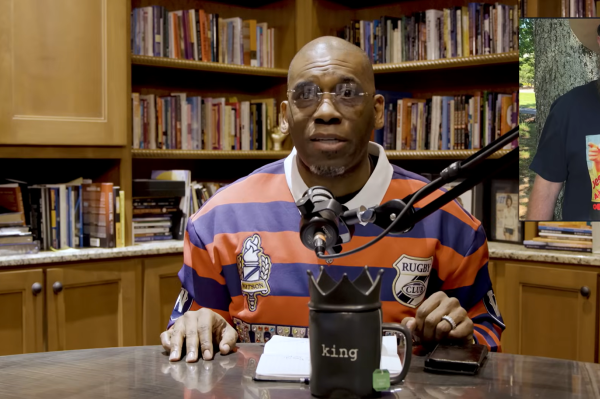'God was in the room': Viola Davis, actors on filming alongside Chadwick Boseman months before death

The director and stars of “Ma Rainey’s Black Bottom” shared how they felt God’s undeniable presence as they filmed alongside Chadwick Boseman in what would be the late actor’s final performance.
Colman Domingo, Glynn Turman and Michael Potts star alongside Boseman and Viola Davis in George C. Wolfe’s film adaptation of August Wilson’s play “Ma Rainey’s Black Bottom.” The film follows the talented-but-hardened blues singer Ma Rainey (Davis) and her band members Levee (Boseman), Toledo (Turman), Cutler (Domingo), and Slow Drag (Potts) as they gather at a recording studio in Chicago in 1927.
Watch Viola Davis discuss "Ma Rainey's Black Bottom" with The Christian Post
Boseman, who had been fighting a private battle with colon cancer at the time the movie was filmed, died in August at the age of 43, less than a year after it wrapped.
Much of the film takes place in the rehearsal room — a nod to the original 1984 production — where the band members reveal their respective characters, beliefs and fears.
In one particularly poignant scene, Levee and Cutler spar — both physically and verbally — over the latter's belief in God. Cutler is a devout Christian, while Levee, traumatized by his past, is a sharp-tongued atheist.
In an interview with The Christian Post, Domingo explained that “Ma Rainey’s Black Bottom” nevertheless grapples with questions of faith, addressing doubt, injustice and God’s goodness.
“August Wilson does wrestle with faith,” he said. “He also writes about that part about us that ... nags us, even if we believe with all of our heart, sometimes we have that question when we're presented receipts, when someone says, ‘Why did that thing happen? Why did that atrocity happen? [Why were] those people killed? You're telling me to believe in something when my receipts from my life experience have shown me otherwise. You're still telling me to believe, but this is all I have.’”
But Levee’s truth, he said, is in “direct conflict” with Cutler, who relies heavily on his faith for strength — particularly in segregated America.
“Cutler needed to stop the sound because he didn't want that doubt to creep into his faith because that's all he had,” Domingo explained. “He was a man of many words, and now he lost his words.”
The actor revealed that as he and Boseman filmed that scene, everyone present was struck with the sense that God was present — even though only a small circle knew about the actor’s dire health condition.
“It was powerful,” he recalled. “And I tell you I knew that day — and these men will attest it — God was in the room. The Divine was in the room because it required that work to bring ourselves into it.”
Watch Coleman Domingo discuss "Ma Rainey's Black Bottom" with CP
After fighting with Cutler over religion, Levee redirects his anger to God Himself, engaging in an expletive-riddled argument with Him. Following the scene, Boseman reportedly broke down in tears.
Wolfe told CP that the scene both “unsettled” and “profoundly affected” everyone present, adding: “It was such a really, really fascinating thing to see how naked the words made everybody feel.”
“There were a couple of times where Chadwick was doing that monologue and it emotionally affected him so greatly,” Wolfe recalled. “Then the actors were there to support him on his return back to Chadwick once he finished doing Levee.”
“Ma Rainey’s Black Bottom” is not a faith-based film and includes elements that are likely to offend Christian viewers. The film is rated R for sexual content, strong language and brief violence.
Davis, the recipient of an Academy Award, a Primetime Emmy Award, and two Tony Awards, stars opposite Boseman as the intimidating, powerful Ma Rainey.
She discussed how the film explores the complex role Christianity has historically played in African American culture. Though Christianity is "so much a part" of the black community, "much of the motor" of systemic racism has historically come from professing Christians. Slaveholders, for example, would frequently use the Bible to justify slavery.
"I'm a Christian so I can say this," Davis said. "It was in reconciling God, Christ, but also the players and the messengers, which we know are two different things. We make a distinction between the man, the messenger and the message."
"Christianity is so much a part of our community, Pentecostal church, the Baptist Church, but so much of the Christian community was involved in persecuting us," she continued. "So then, how do you reconcile that? How do you show that in a drama, without blasphemy?"
Wilson's play, she said, shows the "complexity of that cognitive dissonance" of racism existing alongside the Gospel of Jesus Christ.
"He shows it in Cutler, who says, 'You don't blaspheme my God. That's my God. This is someone who's keeping me alive and keeping me on my feet,' to Levee who is saying, 'Where was God when ... my mom was being raped?'"
"I think God can handle that," she said, adding: "I think [Wilson] toes the line really beautifully as to our complicated relationship with Christianity."
Boseman’s moving final, performance, according to those working alongside him, is a reflection of the pain he was going through at the time. But unlike the character he played, Domingo said, Boseman, like his three co-stars, was an undisputed “man of faith.”
“A play such as this covers so much of the human experience that if you're going through something, you can really find a parallel in this work,” Turman told CP. “As actors, what we do is we just transfer all of that into the character that we're doing or the piece that we're working on.”
“That’s what Chadwick was able to do,” he continued. “He was able to use this piece as a venue to express all that he was going through at that particular time. Only those who knew, knew. We get the benefit of the final act, and we're richer for it.”
"Ma Rainey's Black Bottom" is now streaming on Netflix.
Watch George C. Wolfe discuss "Ma Rainey's Black Bottom" with CP.





















